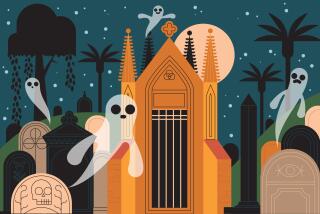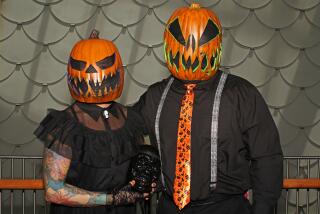Exorcism Flourishing Once Again
RALEIGH, N.C. — Days before Halloween, the demons already were loose in this southern town of tall pines and steepled churches.
Bob Larson, an evangelical minister who has honed the art of exorcism into astonishing public performance, was facing down the demon of witchcraft in Karen Ward, a 42-year-old medical administrator. Or so the guttural voice that emanated from the woman identified itself.
Before a standing-room-only crowd in a Hilton hotel here, the voice growled that it had gained a foothold in Ward by cursing her bloodline 10 generations ago, had pushed her into evil sex and intended to keep her in its grasp.
Oh, yeah? Larson snarled, brandishing a Bible in one hand and a microphone in the other. “Witchcraft, face me!” he bellowed. “We break every curse! I now call down to you the wrath of God. Go now to the pit!”
“To the pit!” the crowd chanted.
At once, Ward’s contorted face relaxed. She hugged Larson as she called out thanks to Jesus for her deliverance. The crowd went wild. Later, she said the healing was genuine and all her demons were “completely gone.”
The ancient ritual of exorcism, which fell out of favor in the Age of Reason, is once again flourishing in the Age of the Internet.
End-of-the-world fears? A desire stoked by Hollywood occult films? Ministers looking for new lines of work?
Whatever the cause, hundreds of exorcism ministries now exist--some with names like Demon Stompers that offer personal deliverance testimonies and toll-free lines for convenient counseling.
Along with the heightened public interest in exorcisms has come a passionate debate on the nature of evil and the proper role of the ritual among Christians.
“It’s a sensational, fast-food solution to long-term problems that absolves you of any responsibility for your vices,” says Hank Hanegraaff of the Christian Research Institute in Santa Margarita. “I call it Flip Wilson theology: ‘The devil made me do it.’ ”
Counters Larson, whose Colorado-based ministry offers exorcisms by radio and conferences nearly every week: “Critics can take all the cheap shots they want, but we are genuinely trying to do something about the suffering of people.”
Exorcisms are nearly as old as human civilization, practiced from antiquity by Babylonian priests, tribal healers and Jesus, himself. But, according to historians, exorcisms declined in Western churches about 200 years ago only to begin resurfacing in the 1970s.
Recent growth seems brisk: An international exorcism association established by the Vatican’s chief exorcist attracted just six practitioners to its first conference in 1993, but drew more than 200 exorcists and their lay assistants this summer.
In the United States, the Catholic Church has quietly increased the number of appointed exorcists from just one in 1990 to between 15 and 20 today, according to Michael W. Cuneo, a Fordham University associate professor and author of a soon-to-be published book, “American Exorcism.” Moreover, he says, countless maverick priests are performing bootleg rites without their bishops’ required permission.
The Chicago Archdiocese made international headlines last month by confirming that it had appointed an official exorcist a year ago for the first time in its 160-year history.
Cardinal Francis George made the appointment after repeated requests for the ministry from Catholic prayer groups. The unidentified exorcist has so far conducted one ritual, deemed successful, says Robert Barren, a theology professor and archdiocesan spokesman on exorcisms.
(In the Los Angeles Archdiocese, the exorcist position is vacant, according to a spokesman.)
Some Cases Involve Beatings, Death
But the number of Catholic exorcists pales next to those in the world of charismatic and evangelical Protestantism. Among theologically conservative evangelicals alone--those who don’t believe in speaking in tongues and other Pentecostal gifts--Cuneo says exorcism ministries have skyrocketed from a handful in the early 1980s to more than 600 today.
The Fordham scholar has personally witnessed more than 50 exorcisms--most of them performed out of genuine spiritual compassion with no demand for fees, he says.
But people have been beaten and even killed in exorcisms, including a Korean woman in Los Angeles who died after a six-hour ritual in 1996.
And experts say the psychological dangers of what some see as playing with people’s minds and telling them they are possessed can be great.
“When anything and everything can be demonic, you are setting yourself up to be a spiritual paranoid,” says Father Mitchell Pacwa, a Jesuit priest and University of Dallas scholar who has studied exorcisms for 25 years.
Cuneo attributes the apparent rise in exorcism requests to popular culture. From the 1973 release of the movie “The Exorcist,” which was re-released last month, to Harry Potter books today, an endless string of films, books and TV talk shows has made the occult part of general discourse, he says.
Geraldo Rivera, Oprah Winfrey, Larry King and Barbara Walters have all featured exorcists on their shows, Cuneo says.
“Should we not think that exposing people relentlessly to this talk of demons wouldn’t have some effect?” he says.
America’s most well publicized Catholic exorcist, Father James LeBar of New York, agrees--to a point. “The Exorcist” publicized the possibility of possession and the fact that the church could help, he says, fueling the growth in requests for services.
But the larger driving force is a rise of Satanic cults, music and other malevolent influences that has opened more people to evil, he believes.
A decade ago, LeBar received no requests for exorcisms; today he is referred to 25 to 30 cases a month.
“People dabbling with the occult are playing with a spiritual loaded gun, and they will be faced with something far bigger than they can handle,” Pacwa says.
Others say a decline in morals and family life is opening the door to demonic forces.
At Harvest Rock Church in Pasadena, a team of 25 counselors focuses on exploring whether an afflicted person had childhood traumas or problems with parents.
If so, the experiences likely created what lay pastor Albert Landry calls ‘Satan’s strongholds”--anger, bitterness and resentment, a lack of forgiveness. When those emotions are dissolved through prayer and repentance, he says, “the demon leaves on his own because he has nothing to hold onto.”
“In the early days, we would cast out demons, but we would find they would come right back again,” says Landry, who has worked in deliverance ministry for nearly 20 years. “The counseling approach gets to the root of the problems.”
Whether possession is real or imagined has been debated for centuries.
Catholics are cautious about diagnosing possession. An exorcism requires a bishop’s authorization after all physical and psychological causes for problem behavior are ruled out. LeBar says only 5% to 10% of all cases he examines warrant an exorcism.
Despite that screening, Richard Woods, a Catholic priest and psychotherapist with Loyola Hospital in Chicago, says he has examined hundreds of cases and has not yet found one that convinced him of genuine demonic possession.
Even the celebrated St. Louis case on which the book “The Exorcist” was based has been grossly exaggerated, Woods says. The psychotherapist was able to read the eyewitness note taker’s confidential transcript of the 1949 exorcism and found nothing more dramatic than “a frightened boy” of 13.
Over time, he says, the story became embellished. In an interview years after the ritual, for instance, one participant reported that an exorcism manual spontaneously burst into flames. But the transcript, Woods says, reported merely that the boy tore out a page.
A large body of clinical literature and anthropological studies has shown that in times of social upheaval, people act out their fears through trance states and other possession-like behavior, Woods says.
Hanegraaff adds a theological twist, arguing fiercely that Christians cannot be possessed by demons at all because they are filled with the superior power of the Holy Spirit. The fact that so many Christians believe otherwise demonstrates an appalling degree of Bible illiteracy, he says.
By contrast, Landry at Harvest Rock says demons may enter anyone who sins.
And Larson not only believes Christians can be possessed, but he also has developed an elaborate system explaining how.
Videos, books and tapes detail his theories on the four laws of spiritual warfare, six strongholds of Satan and four ways that Satan can acquire the legal right to possess a person--through a generational curse, for instance, or “soul ties” forged through sex with a demon-possessed partner. Sales of the products supplement the fee--$39 to $49--that he charges for exorcism workshops following his free, public conferences.
The diverse views amid rising public interest in exorcisms are challenging seminaries and schools to wrestle with how to teach the topic.
In 1994, Biola University in La Mirada began a course on exorcism and the related concept of “spiritual warfare,” which primarily views the Christian life as one of battle between God and Satan.
Last week, Fuller Theological Seminary in Pasadena convened the first in a yearlong series of meetings among its schools of psychology, theology and missions to begin exploring how to train its future ministers to deal with the controversial topic.
Among other things, says Fuller Provost Russell Spittler, some of the school’s Asian faculty had expressed dismay that spiritual warfare proponents are overtaking churches in South Korea.
Others, however, believe the school should affirm the ministry and prepare people for it. Spittler, raised in the evangelical Assemblies of God tradition, believes there is a place for exorcisms, although “I wouldn’t be surprised if more people were not helped by them.”
Believers Say They Need Help
In any case, the demand seems unabated.
The wide range of people seeking relief was evident at the Raleigh gathering, where more than 300 people sat transfixed by Larson’s spectacle.
Jean confessed that she was sexually abused at the age of 6 and is plagued by multiple personalities. Steve, a bearlike man of 46, vented anger at his father for a lifetime of verbal abuse. Diane, a willowy brunet, told Larson she was given up for adoption, raped and institutionalized in a psychiatric hospital 23 times. Then she stood up and screamed: “I am angry at everyone!”
Alex Cleghorn, a 52-year-old home remodeler, came to Larson’s conference with his family in the hopes of deliverance for his son Chris, 27. As a boy of 7, Chris was molested by a family friend and has suffered from emotional problems ever since.
Therapy has not helped, but the conference seemed to have an impact. Chris burst into tears when the exorcist homed in on him, and he hopes for more concentrated attention from Larson later.
“I believe this man is on to something America needs,” Cleghorn said. “That is to help people in their wounds and hurts.”
More to Read
Sign up for Essential California
The most important California stories and recommendations in your inbox every morning.
You may occasionally receive promotional content from the Los Angeles Times.











